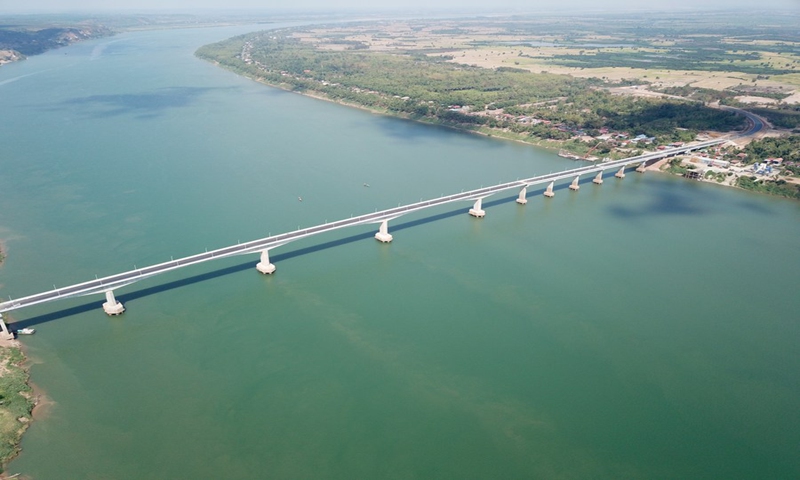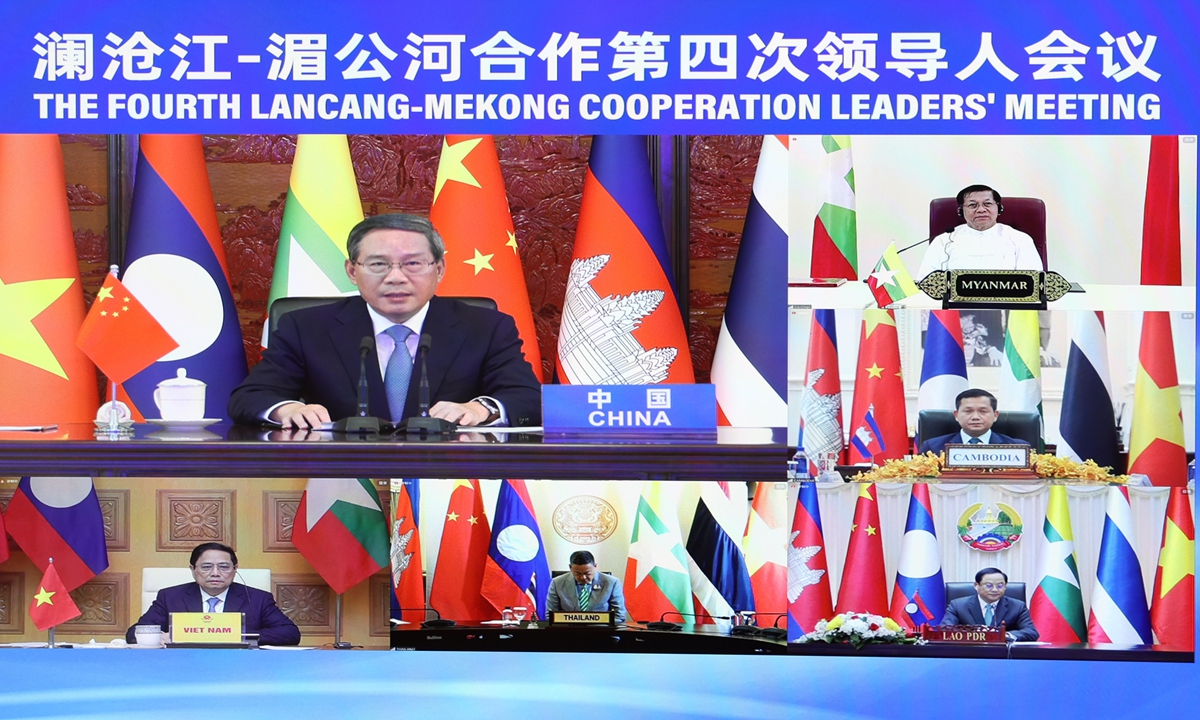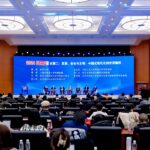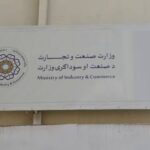Chinese Premier Li Qiang attended the fourth Lancang-Mekong Cooperation (LMC) Leaders’ Meeting via videolink on Monday, with the attendance of leaders from Cambodia, Laos, Myanmar, Thailand and Vietnam, the five ASEAN member states that the Mekong River runs through. China called for the deepening of development for regional integration and security cooperation to crack down on telecom fraud among the six countries.
Diplomats from the five Southeast Asian countries reached by the Global Times highly valued the cooperation with China in recent years in terms of sharing water resources of the river and flood control, which greatly improved people’s livelihood along the river. Experts said that in the next phase, the LMC will bring more opportunities for cutting edge technologies, and the region will further benefit from the cooperation and reinforce regional stability.
Li co-chaired the meeting with Myanmar’s leader Min Aung Hlaing. Cambodian Prime Minister Hun Manet, Lao Prime Minister Sonexay Siphandone, Thai Prime Minister Srettha Thavisin, and Vietnamese Prime Minister Pham Minh Chinh attended the meeting via video link, according to China Central Television (CCTV).
During the meeting, Li made four suggestions on strengthening Lancang-Mekong cooperation: First, deepening integrated development, and strengthen cooperation in economy, trade, production capacity, agriculture and intelligent manufacturing. Second, to promote green cooperation and fully respect the legitimate rights and interests of all countries in the reasonable development and utilization of water resources.
Third, to strengthen security governance and vigorously crack down on criminal activities such as online gambling and telecom fraud. Fourth, to deepen people-to-people and cultural exchanges and cultivate new highlights in cooperation among youth, think tanks, and local governments.
The leaders of the five Mekong countries thanked China for its outstanding contribution to promoting Lancang-Mekong cooperation, and said that the six countries should share opportunities and deal with challenges together, jointly plan the future development of Lancang-Mekong cooperation, and strengthen cooperation in all fields to build the Lancang-Mekong economic development belt, and build a community of shared future for Lancang-Mekong countries, CCTV reported.
The Lancang-Mekong area is one of the regions with the greatest development potential in Asia and beyond.
Originating from China’s Qinghai-Xizang Plateau, the river has its source in Yushu of Qinghai Province. It is called Lancang River in China, and after flowing out of Yunnan Province, it is called the Mekong River. It runs across Myanmar, Laos, Thailand, Cambodia, and Vietnam, is 4,880 kilometers in length, covers an area of 795,000 square kilometers, and feeds 326 million people, according to the LMC China’s official website.

Aerial photo taken on March 11, 2021 shows the eighth Cambodia-China Friendship Bridge across the Mekong River, connecting Kampong Cham province and Tboung Khmum province in southeastern Cambodia. (Shanghai Construction Group/Handout via Xinhua)
Fruitful achievements
Zhou Zhiwei, secretary-general of the Lancang-Mekong Water Resources Cooperation Center, told the Global Times on Monday that since the implementation of the Five-year Action Plan on Lancang-Mekong Water Resources Cooperation (2018-2022), the water resources authorities of the six member countries have been actively organizing and implementing more than 50 water-related livelihood projects.
The Lancang-Mekong Sweet Spring Project has established a total of 62 rural water supply technology demonstration points, providing local residents with safer drinking water and also technical demonstrations for the member countries, Zhou said. Another project, named Dam Safety Evaluation Action Plan for Lancang-Mekong Countries, has conducted safety inspections and demonstrations on dams in Laos, Thailand, and Vietnam. Safe wings have been installed for the dam to better serve people, Zhou noted.
China also supported the implementation of hydrological monitoring projects and has built a central station and 25 automatic monitoring stations in Laos. “It will help us to better understand rivers and lakes, and better respond to flood and drought disasters,” Zhou told the Global Times.
At the same time, it should be noted that our six countries are facing big challenges to achieve the goals of the 2030 Agenda for Sustainable Development. It is necessary for us to work closely to promote practical cooperation under the guidance of the Five-Year Action Plan on Lancang-Mekong Water Resources Cooperation (2023-2027). “Our six countries should work together to deal with various water issues and climate change to contribute to the building of a community with a shared future of peace and prosperity among Lancang-Mekong countries,” Zhou noted.
Good for all
With progress and results delivered daily, monthly and annually, we have created an LMC speed, and fostered an LMC culture featuring equality, sincerity, mutual assistance and kinship. LMC has become a stellar example for countries to develop relations with each other, conduct regional cooperation and pursue South-South cooperation, Wang Wenbin, a spokesperson of China’s Foreign Ministry said Friday.
The LMC projects have brought broad benefits to China and its neighbors, especially in terms of water resources and flood control. The Mekong River countries sent diplomats to visit Southwest China’s Yunnan Province earlier this month. The diplomats highly praised the achievements made by the LMC in recent years and expressed hope for further cooperation.
Under the LMC’s special fund projects, installation of automatic water level and rainfall monitoring systems at Myanmar’s border areas on the Mekong River for the flood early warning system project was successfully implemented and completed from July 2020 to April 2022.
Based on this project’s success, Myanmar would like to cooperate with China for stream flow measurement of water resources management and research into the impact of climate change on water resources management in the next five years, Win Myat Aung, Education Counsellor of Myanmar Embassy in Beijing, said at the Lancang-Mekong Trip 2023, which concluded in mid-December.
During the joint trip to Southwest China’s Yunnan Province that gathered diplomats and representatives from Cambodia, Laos, Myanmar, Thailand, and Vietnam, the Global Times witnessed foreign diplomats’ keen interest and continuous praise for China’s dams on the upper stream of the Mekong River. The representatives were impressed to see how the hydropower projects bring practical benefits to downstream countries through flood control, water supply, power generation, and ecological protection.
“Thailand has seen the benefits of Lancang-Mekong Cooperation,” said Wanapol Sangiamsin, deputy consul-general at the Royal Thai Consulate General in Kunming, during the visit. “As the incoming co-chair of the Lancang-Mekong Cooperation, Thailand looks forward to collaborating closely with other Lancang-Mekong colleagues toward the realization of a peaceful community of shared future, sustainable development, and prosperity.” After the LMC leaders meeting this year, Myanmar will hand over the co-chairmanship of LMC to Thailand.
“I highly value an active contribution from member countries, especially China, in Mekong-Lancang development, particularly in 2021 when many projects were adopted by the leaders that supported the LMC special fund, and I do believe that in the coming years, the water related projects will increase productively,” said Singhalath Boupha, the third secretary of the Embassy of the Lao People’s Democratic Republic in Beijing.

















